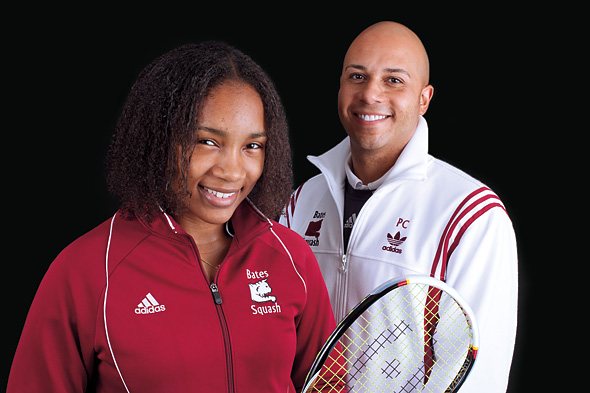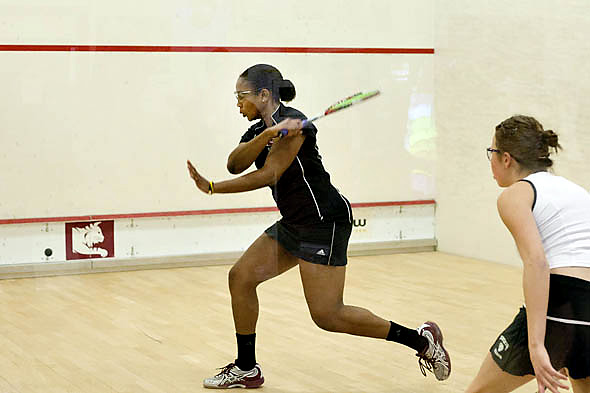Sports Notes: squash standout Cheri-Ann Parris '13
Barbados native Cheri-Ann Parris ’13 contributes an island attitude to Bates squash
By Andy Walter
The Barbados squash community is as small as the 166-square-mile island, so Cheri-Ann Parris quickly heard about a U.S. college coach trying to schedule matches for the team’s winter training trip.
The coach wasn’t getting anywhere, which didn’t surprise Parris, then 16. “It’s the Caribbean,” she says. “We have in our heads that things just happen as they happen.”
Cultural realities notwithstanding, she felt the coach’s pain — the prospect of a team traveling 2,300 miles to play among themselves. “Now that would’ve been kind of pointless,” she says. “I’m glad he talked to me.”
The coach she helped was Pat Cosquer ’97. At the time, in 2007, he was director of squash programs for StreetSquash, a community youth-outreach center in Harlem. He had volunteered to help with the Bates trip after head coach John Illig decamped for Middlebury in August.
And at the time, Parris was an emerging Barbadian squash standout. In fact, when the Bobcats visited Barbados in 2008, she was on another island, Great Britain, competing in the Scottish Open.
“Once I love something, I just go for it.”
Today, of course, both Cosquer and Parris are at Bates, each coming off accolade-filled 2010 seasons. Appointed women’s and men’s squash coach in May 2008, Cosquer won NESCAC Coach of the Year honors in 2010, while Parris, Bates’ No. 1 player from the start, was named NESCAC Rookie of the Year.
For her, Bates is part of a trajectory. The better she got in squash, and the more international tournaments she experienced, the more she wanted to test herself. “Once I love something, I just go for it,” she says. “I have to have some sort of goal. With squash, I wanted to play in college and represent squash to the best of my ability.”
Parris met Cosquer face to face when she visited campus in September 2008, arriving straight from a tournament in Ecuador. She hasn’t been fazed by going to college in a country famous for its busy-ness and scheduling. “I prefer to be on a schedule and stick to it,” she says. “I don’t want to be up in the air. I would rather have planned stuff to do. It’s a bit hectic, but it’s fine.”
Growing up, Parris was also an accomplished chess player, and although that interest waned, she clearly enjoys one-on-one competition that rewards strategy and mind games.
“In squash, like chess, you need to think about this shot and the next one,” she says. “You think about how to place a shot so the opponent can only make his shot based on your shot. You have constantly to be thinking about what to do, how to retaliate, how to put your opponent out of position.” Same as chess, she says. “If your opponent moves a pawn to near a bishop, you know the next moves, the squares where they can go.”
In turn, Parris is the type of player Cosquer wants for the Bates squash program. By American standards, her Caribbean background makes her appear easygoing. In truth, she’s a charismatic leader who can kick a teammate’s butt at practice then lead the cheering for her during a match. “She’s always putting someone else before herself,” Cosquer says.
In her first season, Parris won her final 10 team matches en route to an 11–0 NESCAC record and rookie honors. The women’s team ended the season ranked No. 11, and the men’s team at No. 12.
“Cheri could have just done her own thing, won every match at No. 1, and not helped anybody else,” Cosquer says. “And we would have finished 13th or 14th. Instead, she said, ‘I’ll work on myself for a little bit and then I’m going to coach the No. 8 player so she wins her match.’ That’s what separates her.”
Cosquer’s own path back to Bates wound not through a prep school coaching job or an Ivy League assistantship but through Harlem and StreetSquash, one of a handful of intensive and disciplined urban programs that meld squash and academic instruction to further students’ college opportunities.
“At Bates, once you’re here, you’re part of this family.”
His vision for Bates squash is similarly amalgamated. He wants players from varied walks of life who can bask in each other’s life experiences and perspectives.
“All that friendly, fuzzy Bates stuff makes it easier for kids who have never been in an environment like this,” he explains. “Other schools are as academically rigorous as Bates but are more cutthroat. We are very competitive and want to be great at everything we do — but not at your expense.”
Cosquer, who played both squash and baseball at Bates, says coaches like George Wigton and Bob Flynn personified those ideals. “They turned me from a boy into a man,” he says, while always letting him know that “at Bates, once you’re here, you’re part of this family.”
For Cosquer’s squash program, it means the off-campus Bates Squash Center can be both a comfortable hangout and a competition site. Team hiking trips and yoga sessions can be equally as valuable as practice time.
And it means that a men’s player like captain Patrick Williams ’11, a product of SquashBusters in Boston, a cousin of the StreetSquash operation in Harlem, can establish the Aspirations Squash Enrichment Program in Lewiston to support Somali and Sudanese children. Parris is all for Cosquer’s one-for-all ethic. “Everyone is together in Bates squash,” says the island native. “We’re cool and collected.”



